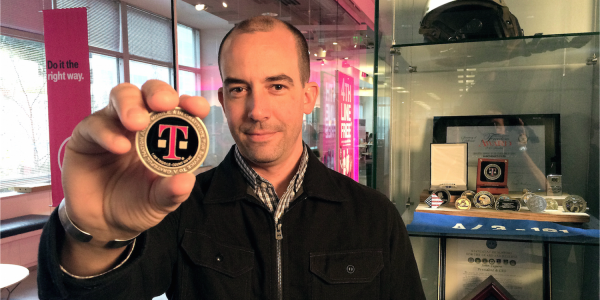

Over the past few years, hiring veterans has become a great way for companies to support the military. But as more and more service members return to the civilian workforce, companies are discovering that post-9/11 vets are equipped with unique skill sets that help them thrive in the private sector, meaning businesses need to work harder to attract and keep these valuable applicants. T-Mobile is one company that’s evolving its recruitment process in order to attract and retain veterans.
“One thing that sets us apart from a lot of companies is that we’re working to create a recruitment process that fully understands and integrates the notion that there isn’t a position at T-Mobile that a veteran couldn’t fill,” said Jen Hamblin, senior program manager for diversity recruiting. “We have a lot of jobs, and there’s a lot of talent out there to fill these jobs. We’re thinking bigger, rather than pigeonholing veterans into specific job categories.”
To that end, Hamblin’s team is focused on more than merely recruiting veterans to fill the obvious roles. Rather, it’s giving veteran candidates who best meet T-Mobile’s needs the support that will help them and the company succeed.
“If you think about the lifecycle of someone who is looking for a job, they do the job search, they get the job, and then they work for the company, and that is really the ongoing relationship they have with the company,” said Tim Waters, president of T-Mobile’s Employee Network Group, Military Honor and Support Community and an Army National Guardsman. “We want to try to focus our efforts on all three of those areas so that we’re meeting the needs of our candidates from the point when they’re a jobseeker all the way to when they’re hired and working in the role.”
The process first starts with recruitment. In August 2015, Hamblin spearheaded a new training approach to help T-Mobile recruiters better understand military culture and the service members who were applying for jobs. Military resumes often contain acronyms and military lingo that are hard for civilian employers to understand. With training, T-Mobile recruiters learned how to decipher difficult-to-read resumes, decrypt the military jargon and acronyms, and better understand how their experience translates to the jobs to which they’re applying.
“It was nice to see that we could understand a rank, an MOS and their job duties to better connect them with current openings,” said Joshua MacDonald, a T-Mobile recruiter in Albuquerque, New Mexico. “That was a huge difference that set us off in the right direction.”
By learning about military culture and what recruiters are likely to see from military resumes, T-Mobile recruiters are able to better prepare themselves to support those applicants throughout the recruitment process. They’re also more equipped to understand their qualifications and ask the right questions in an interview, allowing them to better advocate for their recruits and put them on equal footing with other candidates.
This system of recruitment also helps T-Mobile pull from a wider, more diverse talent pool, better positioning them to find the best candidates for any job.
“The wider and more creative a net we throw, the smarter and more talented people we catch,” Hamblin said. “And the veteran population is a group of remarkably talented people with a huge variety of skillsets.”
But the support T-Mobile offers veterans doesn’t end once a candidate is hired and brought on board. All T-Mobile employees have access to mentors within the company to provide guidance, and veterans are able to connect with other service members who might be best suited to guide them through their own unique career challenges and aspirations.
“We as an organization believe very strongly in , and I think that’s evident, because we have support all the way from the CEO down the company,” Waters said.
In addition, Waters and his Employee Network Group are able to help supervisors understand their employees’ needs as their career continues within the organization, allowing veterans the chance to be on equal footing with their peers and build their careers without the kind of roadblocks that the military-civilian divide has the potential to create in the workplace.
And while Waters is proof that T-Mobile’s recruitment and support methods have helped service members and veterans find jobs within the organization, Hamblin insists that the motives for hiring veterans are purely the right business strategy for T-Mobile.
“Investing in the recruitment and hiring of military members is a smart business strategy,” she said. “The more diverse the team, the more successful the business. We are unabashedly honest about the fact that we are looking to be the best at what we do and beat our competitors to the punch every single time – and that includes hiring the best talent.
We don’t have conceptions about where veterans should fit into this company,” she added. “Instead, we allow them to demonstrate their strengths and dedicate ourselves to giving them the best opportunity at presenting themselves.”